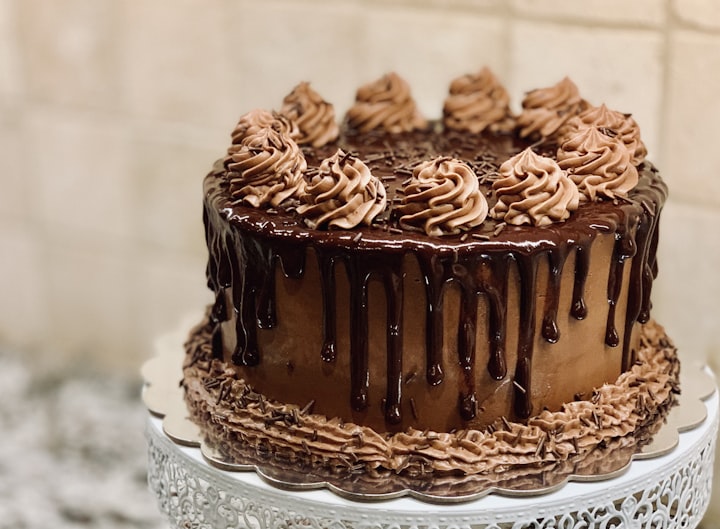Evergreen
You can't always get what you want

Heather peered through the bars of the rusted gate. “You’d think she’d at least have done something with the picnic tables," she said. “They’re rotting—”
“I’m surprised she locked the gate.” In all the years we’d lived there, mom had never locked it, not when the place closed for the season, not even when it shut down for good.
I hugged myself a little more tightly as I stood next to her. It might get cool at night in Boston, but in Maine it was full-on cold, even in the middle of July.
My twin sister fumbled in her purse and extracted what had been my mother’s massive ring of keys. “Mom never was a fan of change.”
I finished her thought. “Even before she started drinking.”
She smiled crookedly as she began trying keys in the lock. “Just like old times.”
It was. Sort of.
The campground did look exactly as I remembered it, other than being a little worse for wear. Stovepipe chimneys rose out of tiny log cabins with tin roofs and sloping porches. Chipped picnic tables stood next to stone fire pits. Every cabin had been named after a different type of tree and boasted one of mom’s “log-font” signs above the front door. Every set of wooden shutters had matching pine silhouettes.
After the third key failed to open the gate, Heather pressed her lips together. The color rose in her cheeks as her long blond hair fell across her face.
“Come on.” I started for the trail that ran from the dirt road to the main lodge. “It’s not that far. We don’t need to drive.”
“Sure.”
My dreamy, unathletic sister wasn’t on brand but I was still practical Sage, the dark half of our twin set. Spirits and horror-movie scenarios didn’t scare me but wasted time did. The trip to the campground was Heather’s idea and I’d agreed to it for her sake, but I wanted to get what she'd come for and hit the road.
“Thanks, by the way.” She fell into step behind me. “For everything.”
I glanced over my shoulder. In her sandals and strappy sundress, Heather was even less prepared for the weather than me. Her radically diminished wardrobe was why we were here, in a way. I should have grabbed us a couple of sweatshirts when I headed to Logan to meet her plane. I usually thought of stuff like that, so I guess I wasn’t totally on brand either. “But I didn’t do anything.”
“You picked me up.” She was a little out of breath. “You handled all the arrangements. The funeral, the—"
She broke off. There hadn’t been a wake. Back in the day, mom had her campground regulars, all three of them, and during the off-season she’d had her bar friends. But by the time she got around to dying of cirrhosis, nobody was left to say goodbye. Just me, Heather and a few stragglers who had probably wanted to escape the morning rain.
“If you could've gotten here sooner, you would have.” I forced my thoughts away from the funeral and back to the task at hand. “Anyway, you’ll be here for the meeting with the realtor.”
“The sooner we get this place on the market, the better.”
Who could blame my sister for suddenly being obsessed with money? She’d been struggling in L.A. for years—20, to be exact—without a complaint but then the fire took her bungalow and everything she owned. Other than a suitcase full of donated clothes and a maxed-out credit card, she had nothing.
The sun dipped below the horizon and the trees cast long shadows across the clearing at the center of the campground, but the lodge was the darkest shadow of all. It loomed before us, its chocolate brown wood a sharp contrast with the faded white trim. A sign with the campground name hung over the door, the only difference being it was larger than the ones on the cabins.
Evergreen.
I peered into the forest. There was nothing but trees, the same immense sentinels standing watch, just like they had when we were kids. I don’t know if I was relieved or disappointed.
Heather pushed ahead of me and tried the door. Like the front gate, it was locked but this time she found the right key on the first try. As we crossed the threshold, I turned on my cell flashlight and let its beam sweep across the common room.
It could have been the photograph I kept in my desk drawer come to life. The stone fireplace, the plaid couches, the braided rugs, the tied-back curtains, the stack of board games in the corner—everything matched perfectly. Even the beat-up paperbacks on the bookshelf were the same titles guests had borrowed when we were kids. A row of thick Stephen King novels, Harry Potter and the Sorcerer’s Stone, a smattering of Tom Clancy and John Grisham bestsellers, and a Dr. Phil self-help book.
I ran my fingertip through the dust on the scarred dining table. “I bet there’s still pancake mix in the top shelf next to the stove. Right beside the Mrs. Butterworth's maple syrup.”
“As long as the blue box is still under my bed.” Heather was already climbing the stairs, her own cell flashlight on. “I don’t care what’s in there.”
I didn’t how to be with this Heather. The old Heather had been boy crazy and ridiculously sentimental. She was the sister that videotaped Christmas mornings, even if mom was recovering from a hangover. The 15-year-old who saved every love note Josh slipped her during study hall and turned it into a song.
Granted, I hadn’t seen that Heather—or any Heather—for two decades. She was still obsessed with Josh's handwriting but the reason had nothing to do with love.
Even if the fire hadn’t happened, it had been a long time since anything had worked out for her. When she quit school and took off for L.A. she’d been sure it was only a matter of time before some famous music producer discovered her.
I’d like to say my twin was as delusional about that as she was about everything else, but the truth is she was good. After a computer repairman taught her some chords one day after school, she spent hours in her room practicing guitar and writing lyrics. She strummed melodies until her fingers bled and then started teaching herself piano, plinking out songs until a guest would scream at her to go to bed.
Above me, I could hear her dragging something heavy across the floor. The blue box.
If mom hadn’t bothered to get rid of the psychedelic Afghan blankets folded over the backs of the couches, there was no way she'd disposed of Heather’s precious box. She and my sister might have been at each other 24/7 but nobody believed in her future stardom more than mom. Every song, poem, story and diary entry Heather had written from the age of 5 onward was stored in that box.
Even when Heather turned 36—36!—mom would still text me about her supposedly great prospects. Heather made a new demo tape last week, would appear at 3 a.m. on my cell. Heather saw Billie Eilish at Trader Joe’s! would wake me in the morning.
An f-bomb reverberated across the lodge, followed by an endlessly drawn-out “Nooooo.” Heather didn’t sound like a failed but brilliant singer, more like a mortally wounded, tone-deaf hyena.
I rose from the still-scratchy couch and walked to the foot of the stairs. “Everything okay?” I called up to her.
“What do you think?” she snapped. Somehow she’d lost a sandal and both dress straps had slipped off her shoulders.
“Maybe she moved the box.”
“I found the box. They’re not in there.”
“Then maybe she moved the notes.”
Heather dropped her head and ran her fingers through her hair as if trying to smooth her thoughts. “Everything was exactly how it was before I left. They’re gone.”
“Are you sure?”
“Mom never changed anything. And she wouldn't have gone through my stuff.”
“Then where are they?” I asked. “That doesn’t make sense.”
“My life doesn’t make sense.”
My sister never made it but Josh Trent did. Apparently Heather wasn’t the only one who went home and wrote love songs. Not long after she skipped town to make it big, Josh left too, only he drove straight to Nashville and lived out of his truck until he sold his first song.
The song that won a Grammy. For a painfully long time, soccer moms went around singing along to it in their SUVs. I knew right away Josh had written it for Heather. What I didn’t know was he’d given her the first version in a note. Or that drafts of every song on his first album—the one that went Platinum--had also been in his notes to her. According to Heather, not to mention Southeby's, those drafts were worth money. A lot of money.
Heather practically slid down the stairs. She was that deflated. “I needed those songs. I really, really needed those songs.”
“You could look some more," I said. "And there’s still this place.”
“Right.” She banged the front door open and slumped into one of the Adirondack chairs on the porch. “As if anybody’s gonna buy this dump.”
I sat down next to her, pulling a psychedelic Afghan over my knees and handing her one. She wrapped the blanket around her shoulders and stared at nothing.
At first, I thought it was a firefly.
Just like last time, when we were 10 and the green light flashed at us from the depths of the forest. It was too big to be a firefly, we'd decided, then had labeled it a UFO and tried to photograph it.
It was too small to be a UFO though. The photos didn't come out and we never saw it again but that didn’t faze my sister. It was forest magic, she explained, unphotographable. Later, she said it was a money light, a sign that one day we’d be rich. At some point, around the time the lodge closed and she turned 20, she realized her mistake about that one.
Heather leaned forward in her chair. “Is that—” she whispered. “Do you—”
“Yes,” I whispered back. “And yes.”
Another light appeared, the same unearthly green as the first. It floated before us, a perfect oval. Then a third. And a fourth.
All at once the campground was a sea of suspended emeralds. Some nearly reached the tips of the trees. Others bloomed close to the ground and still others shone through the immense branches of the pines.
Heather jumped up so fast her chair fell backwards. She crashed through the door and was back in seconds, her old guitar in hand.
“They’re notes.” She strummed the guitar as she read the eerie score. “Notes.”
The melody drifted across the porch and merged with the quivering lights. I’d never seen—or heard—anything like it. “I think it’s the trees,” I said. “It’s almost like they’re—”
“—singing,” she finished.
I don’t know how long Heather played. Our flawed, beautiful, broken mother, who had never watched over us, was gone but she held onto the one thing that mattered. The one place. After all these years, the trees were still our sentinels.
The orbs faded as the moon rose and the stars came out. Heather propped the guitar against the wall and we sat in silence.
Then it hit me. “You were right—it was a money light,” I said in a rush. “You’ve got to get the song down on paper. You don’t need the drafts, you don’t need the money from the campground, you only need that song.”
Heather, not sort-of-Heather but the sister I first saw the green light with, shook her head. “It’s not that kind of song.”
About the Creator
Lori Lamothe
Poet, Writer, Mom. Owner of two rescue huskies. Former baker who writes on books, true crime, culture and fiction.






Comments
There are no comments for this story
Be the first to respond and start the conversation.